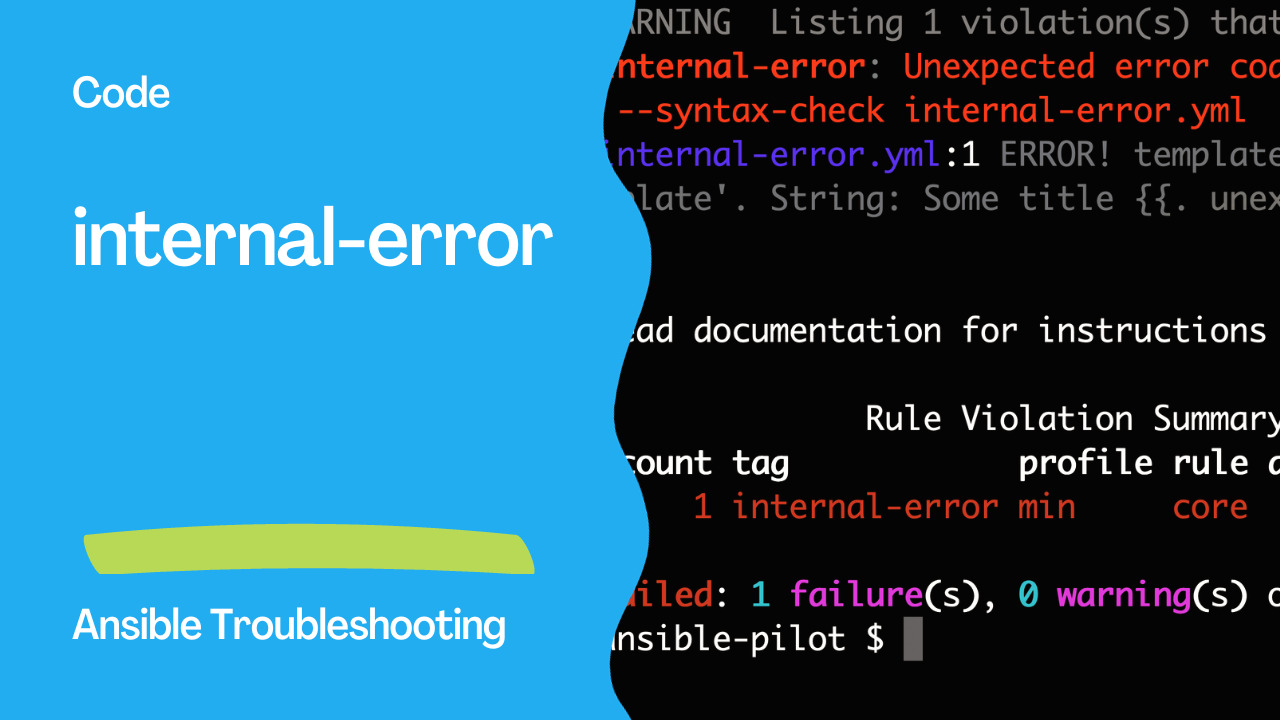Introduction
In the world of automation and configuration management, Ansible shines as a powerful tool that simplifies the management of IT infrastructure. It allows users to define and execute tasks, known as playbooks, that automate various aspects of system administration. However, like any software, Ansible isn’t immune to errors.
One particularly challenging category of errors is the so-called “internal-error.” These errors can be caused by internal bugs within Ansible or by custom rules set by users. They might leave you scratching your head, wondering what went wrong. This article delves into internal errors, how to handle them, and provides insights into common scenarios.
The Nature of Internal Errors
Internal errors in Ansible can be frustrating to troubleshoot. They are not always straightforward, and they can result from various sources. Here are some key points to understand:
Internal Bugs: Sometimes, internal errors are a direct result of bugs within Ansible itself. These bugs can manifest in a variety of ways and may not always provide clear, informative error messages.
Custom Rules: Users can create custom rules to enforce specific coding standards and practices. If these rules are too restrictive or contain errors themselves, they can trigger internal errors.
Continued Processing: When Ansible encounters an internal error, it doesn’t simply halt and terminate the entire execution. Instead, it generates an error message but continues processing other files and tasks. This feature is useful in identifying multiple errors within a single playbook.
Blocking Effect: Once an internal error is detected in a specific file, Ansible will not execute any other rules on that same file. This helps prevent additional issues from piling up in a problematic file.
Detailed Information: Ansible’s internal-error messages often include additional details about the original error or runtime exception that triggered the internal error. This information can be invaluable for troubleshooting.
Problematic Code
In the provided code examples, we have an Ansible playbook, and we’ll break down the problematic code and the correct code, along with an associated error message:
---
- name: Some title {{ # <-- Ansible will not load this invalid Jinja template
hosts: all
tasks: []
In this scenario, the internal error occurs because of an invalid Jinja template ({{)within the playbook. It prevents the playbook from loading and executing correctly.
In the problematic code, there is an issue with the Jinja template. The code includes an invalid Jinja template, indicated by {{ # <--, which is not properly closed. Jinja templates in Ansible should always have opening and closing braces, but this template lacks a proper closing brace. As a result, Ansible won’t be able to load this invalid template correctly.
Ansible Lint Output
WARNING Listing 1 violation(s) that are fatal
internal-error: Unexpected error code 1 from execution of: ansible-playbook -i localhost, --syntax-check internal-error.yml
internal-error.yml:1 ERROR! template error while templating string: unexpected 'end of template'. String: Some title {{. unexpected 'end of template'
Read documentation for instructions on how to ignore specific rule violations.
Rule Violation Summary
count tag profile rule associated tags
1 internal-error min core
Failed: 1 failure(s), 0 warning(s) on 1 files.

Correct Code
---
- name: Some title
hosts: all
tasks: []
In the corrected code, the Jinja template issue has been resolved. The template is removed, and the playbook is now written correctly.
Associated Error Message
ERROR! No hosts matched the subscripted pattern
The error message shown here indicates that Ansible encountered a problem while trying to index a host group variable. Specifically, it’s complaining that there are no hosts matching the subscripted pattern. This typically occurs when you try to access a specific element within a host group that doesn’t exist.
Explanation:
In the problematic code, Ansible encounters an invalid Jinja template, which causes issues during playbook execution. The correct code eliminates this problem by removing the invalid template.
The associated error message further clarifies that there is a problem with indexing a host group variable, which suggests an attempt to access an element that doesn’t exist. To avoid this error and make your code more resilient, it’s recommended to use safe fallbacks in your playbooks. This ensures that even if the index is beyond the size of the host group, your code won’t produce runtime errors.
Handling Internal Errors
Dealing with internal errors can be challenging, but there are a few strategies that can help:
Resolving Bugs: If the internal error is caused by an internal bug within Ansible, you may need to check for updates or look for workarounds. The Ansible community is active, and bug fixes are common.
Review Custom Rules: If you’ve implemented custom rules that trigger internal errors, carefully review them. Ensure your rules are correctly defined and that they don’t overconstrain your playbooks.
Exclusion: If certain files or tasks trigger internal errors intentionally (e.g., for testing purposes), consider adding them to the
exclude_pathsto prevent Ansible from checking them during linting.Use Safe Fallbacks: When writing your playbooks, consider using safe fallbacks. For instance, instead of doing something like
hosts: all[1], which assumes a certain inventory size, write it ashosts: "{{ all[1] | default([]) }}". This makes your code more resilient to potential runtime errors and keeps it safe.
Conclusion
Internal errors in Ansible can be mysterious and frustrating, but they offer valuable insights into your playbooks and rules. Understanding their nature and using the strategies mentioned above can help you navigate and resolve these issues effectively. As you continue to work with Ansible, embracing these challenges will make you a more skilled and adaptable automation engineer.
Subscribe to the YouTube channel, Medium, and Website, X (formerly Twitter) to not miss the next episode of the Ansible Pilot.Academy
Learn the Ansible automation technology with some real-life examples in my
Udemy 300+ Lessons Video Course.

My book Ansible By Examples: 200+ Automation Examples For Linux and Windows System Administrator and DevOps

Donate
Want to keep this project going? Please donate
